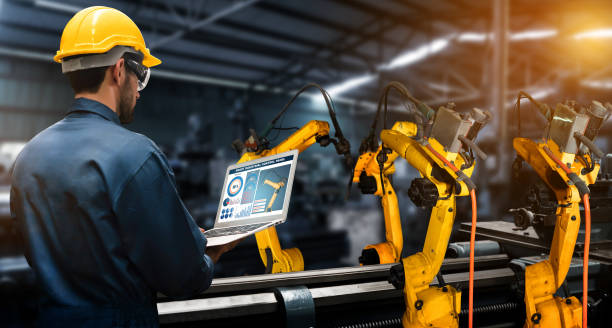In the pulsating heart of Nigeria’s economic landscape, the manufacturing sector stands as a cornerstone for progress and prosperity. As we embark on a journey to understand the pivotal role of manufacturing investments, it is essential to grasp the current state of affairs and recognize why fostering a robust manufacturing industry is paramount for building a stronger tomorrow.
Nigeria, with its vast resources and growing population, holds immense potential for industrial growth. However, the current state of manufacturing is characterised by a mix of challenges and opportunities. Understanding this landscape sets the stage for delving into the transformative power of strategic investments.
Manufacturing isn’t just about producing goods; it’s a catalyst for economic development. By generating employment, contributing to the Gross Domestic Product (GDP), and reducing dependence on imports, a thriving manufacturing sector becomes the linchpin for sustainable economic advancement.
As we unravel the layers of Nigeria’s manufacturing saga, it becomes evident that the choices made today will reverberate in the tapestry of the nation’s future.
Historical Perspective
In understanding the journey of Nigeria’s manufacturing sector, we embark on a historical exploration, tracing its evolution through the pages of time. This retrospective lens not only reveals the sector’s trajectory but also sheds light on the challenges and triumphs that have shaped its identity.
A.Evolution of Manufacturing in Nigeria
The roots of manufacturing in Nigeria can be traced back to it’s modest beginnings, the sector has weathered economic shifts and policy changes, showcasing adaptability and resilience.
B.Key Milestones and Challenges
Examining key milestones provides insights into the sector’s growth, punctuated by moments of innovation and industrial leaps. Simultaneously, challenges such as infrastructure bottlenecks, policy uncertainties, and global economic fluctuations have posed hurdles. Understanding these dynamics is crucial for crafting strategies that resonate with Nigeria’s manufacturing narrative.
As we journey through the historical contours of manufacturing in Nigeria, we discern not only a story of progress but also one of lessons learned and challenges to overcome. This historical perspective forms the canvas upon which we paint the future of manufacturing in the nation.
Economic Impact of Manufacturing

With a historical backdrop in mind, we now pivot to the economic dimensions, where the true significance of manufacturing unfolds. Beyond the assembly lines and production floors, the impact of a robust manufacturing sector reverberates across the nation’s economic landscape.
A.Contribution to GDP and Employment
Manufacturing’s role in contributing to the Gross Domestic Product (GDP) is pivotal. It serves as a linchpin, creating a ripple effect on other sectors. Additionally, the sector’s ability to generate employment offers a transformative force, addressing unemployment challenges and fostering socio-economic well-being.
B.Role in Reducing Dependency on Imports
A self-reliant economy hinges on the ability to produce goods domestically. Manufacturing plays a pivotal role in reducing reliance on imports, fostering economic resilience, and promoting a balanced trade ecosystem.
C.Potential for Attracting Foreign Investment
A robust manufacturing sector acts as a magnet for foreign investors. The potential for growth, coupled with a diversified industrial base, makes Nigeria an attractive destination. Exploring avenues to enhance this appeal becomes instrumental in attracting the foreign capital needed to fuel expansion.
As we navigate the economic intricacies, it becomes evident that manufacturing is not merely a sector; it is an economic powerhouse with the potential to shape the destiny of nations. The economic impact underscores why investments in manufacturing are not just prudent but imperative for Nigeria’s journey toward prosperity.
Infrastructure Development
Transitioning from the economic impact, we pivot our focus to the backbone of any thriving manufacturing sector – infrastructure. The foundation upon which industrial prowess is built, infrastructure development is an integral component for steering Nigeria’s manufacturing landscape toward a brighter tomorrow.
A.Importance of Infrastructure for a Thriving Manufacturing Sector
Robust infrastructure is the lifeblood of manufacturing. From reliable energy sources to efficient transportation networks, each component is a cog in the wheel of industrial progress. Understanding the critical role of infrastructure sets the stage for addressing challenges and seizing opportunities.
B.Current Status of Infrastructure in Nigeria
An objective evaluation of Nigeria’s current infrastructure landscape unveils areas of strength and weakness. Identifying gaps in power supply, transportation networks, and technological connectivity becomes paramount for strategic planning and targeted improvements.
C.The Need for Targeted Investments in Infrastructure
Recognizing the symbiotic relationship between infrastructure and manufacturing, the call for targeted investments becomes apparent. Whether through public-private partnerships or government initiatives, addressing infrastructure deficits becomes a cornerstone for unleashing the full potential of Nigeria’s manufacturing prowess.
As we lay the groundwork for infrastructure discussions, it becomes evident that the strength of a nation’s manufacturing sector is intricately tied to the robustness of its infrastructure. In the quest for a stronger tomorrow, strategic investments in this foundational element emerge as a prerequisite for sustainable industrial growth.
Technology Adoption
In the digital age, the adoption of cutting-edge technologies is not just a choice but a necessity for a thriving manufacturing sector. This section explores the transformative power of technology and its potential to reshape Nigeria’s industrial landscape.
A.Embracing Modern Technologies in Manufacturing
The era of Industry 4.0 beckons, urging manufacturing sectors worldwide to embrace automation, artificial intelligence, and data-driven decision-making. Understanding the potential benefits and challenges of these technologies is essential for steering Nigeria’s manufacturing into a new era of efficiency.
B.Examples of Successful Technology Integration in Other Countries
Learning from global best practices provides valuable insights. Case studies of nations that have successfully integrated advanced technologies into their manufacturing processes serve as beacons, showcasing the positive impacts and lessons learned.
C.The Potential Impact on Efficiency and Competitiveness
Technological integration isn’t merely about keeping up with trends; it’s about enhancing efficiency and global competitiveness. Examining how technology can streamline processes, reduce costs, and improve product quality lays the groundwork for a resilient and competitive manufacturing sector.
As Nigeria charts its course in the digital age, the marriage of manufacturing and technology becomes not just a strategy but a survival imperative. Exploring avenues for technology adoption is pivotal for unlocking new possibilities and ensuring that Nigeria’s manufacturing sector remains at the forefront of innovation.
Government Policies and Support
Navigating the intricate terrain of manufacturing requires a nuanced understanding of the policies and support systems in place. In this section, we dissect the role of government initiatives and explore how a conducive policy environment can propel Nigeria’s manufacturing sector forward.
A.Overview of Existing Policies Supporting Manufacturing
An examination of current government policies aimed at supporting the manufacturing sector provides a foundational understanding. This includes incentives, regulatory frameworks, and strategic initiatives designed to foster growth and sustainability.
B.Potential Improvements and Policy Recommendations
Identifying areas for improvement in existing policies is crucial. Recommendations for refining and expanding supportive measures, addressing regulatory hurdles, and incentivizing innovation contribute to the formulation of a robust policy framework.
As we delve into the realm of government policies, it becomes evident that the partnership between the public sector and the manufacturing industry is instrumental. Crafting policies that align with the sector’s needs and aspirations sets the stage for a collaborative journey towards a stronger and more vibrant manufacturing landscape in Nigeria.
Challenges and Solutions
In the pursuit of a resilient manufacturing sector, acknowledging and addressing challenges is pivotal. This section confronts the hurdles that Nigeria’s manufacturing industry faces and explores strategic solutions to pave the way for sustained growth.
A.Identifying Current Challenges in the Manufacturing Sector
Unravelling the complexities, we delve into the challenges plaguing Nigeria’s manufacturing landscape. This includes issues such as infrastructure gaps, access to finance, skilled labour shortages, and global market dynamics.
B.Proposing Viable Solutions and Strategies
Solutions to these challenges require a multi-faceted approach. From targeted investments in infrastructure to fostering educational programs for skill development, proposing viable strategies aims to overcome obstacles and fortify the foundations of the manufacturing sector.
As we confront challenges head-on, it’s imperative to view them not as roadblocks but as opportunities for innovation and improvement. By proactively addressing these challenges, Nigeria can pave the way for a manufacturing sector that is not just resilient but poised for sustained success in the evolving global landscape.
Conclusion
In the tapestry of Nigeria’s economic narrative, manufacturing emerges as a vibrant thread, weaving together progress, resilience, and untapped potential. As we draw the curtain on our exploration of why manufacturing investments matter for a stronger tomorrow, a synthesis of key insights beckons.
We’ve journeyed through the historical nuances, economic impacts, infrastructural imperatives, technological frontiers, and the symbiotic relationship with government policies. Collectively, these elements underscore the pivotal role manufacturing plays in shaping the destiny of nations.
The roadmap to a stronger tomorrow requires collective action. Government entities, private enterprises, investors, and the workforce, all are stakeholders in the narrative of Nigeria’s manufacturing resurgence. A united commitment to strategic investments, policy reforms, and technological embrace forms the crux of the call to action.
In the grand tapestry of Nigeria’s economic evolution, manufacturing investments are not just a fiscal decision; they are a commitment to a future where innovation thrives, employment flourishes, and the nation stands resilient in the face of global economic dynamics. The echoes of today’s manufacturing choices will resonate in the corridors of progress for generations to come.












